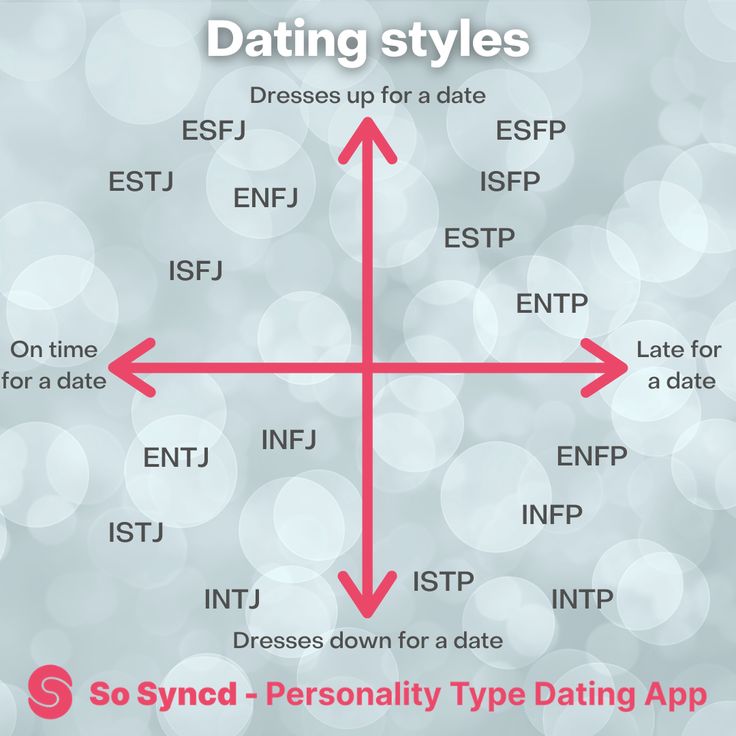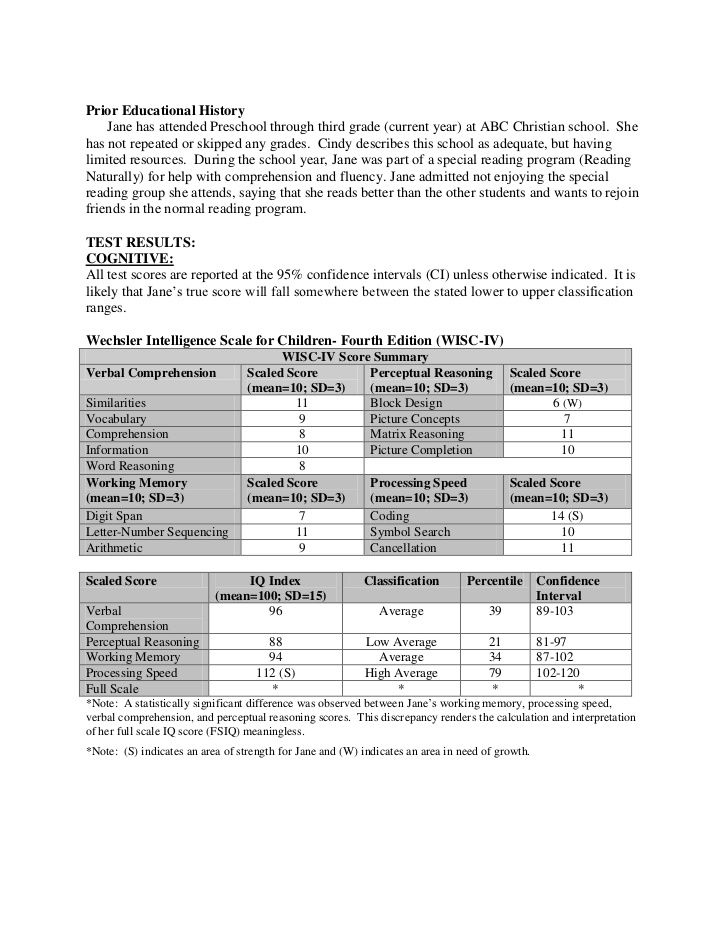Respecting your self
What It Is, How to Achieve It, and Why It's Important
Self-respect is knowing you are worthy and treating yourself accordingly.
Respecting yourself is the first step toward understanding you deserve love, consideration, and opportunities like everyone else.
“Our level of self-respect acts almost like a blueprint to instruct others how to engage with us,” says Jaime Zuckerman, a licensed clinical psychologist in Philadelphia. “When we develop healthy reciprocal relationships, we find ourselves surrounded by those who respect us, support us, and treat us how we want to be treated.”
Self-respect is loving yourself and treating yourself with care. It’s the result of staying true to your values and not being willing to compromise.
The more you engage in behaviors consistent with your beliefs and values, the more you’ll feel fulfilled and confident. This, in turn, will improve your sense of well-being, says Zuckerman.
Respecting yourself also prevents you from comparing yourself and your life with other people. This may be especially important in today’s digital world.
“Self-comparison is rampant on platforms such as Instagram and TikTok,” says Zuckerman. “When we have a low level of self-respect, we tend to engage in more social comparison, which makes us feel worse about ourselves, not good enough, and minimize our achievements.”
At its core, self-respect is a form of self-care.
“When someone has self-respect, they have accepted themselves and believe that they are deserving of belonging in the world,” says Divya Robin, a psychotherapist in New York City. “We are wired to want connection and a sense of belonging, so self-belonging and acceptance is incredibly important for psychological health, too.”
If you feel you need to work on caring more about yourself and showing more self-respect, these tips can help you take the first step.
1. Try to revisit your values
If self-respect means acting according to your values, the first step must be to clarify what your values are.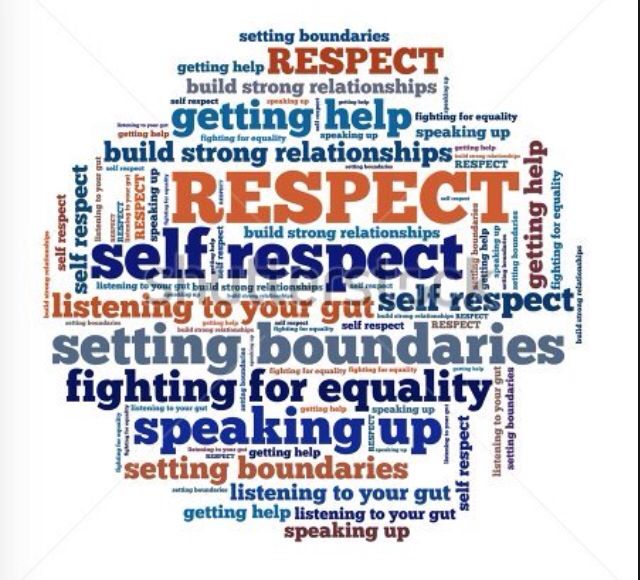
Values are firm beliefs about what’s important or desirable to you in life.
For example:
- integrity
- tolerance
- loyalty
- generosity
- cooperation
- wisdom
- commitment
To define your core values, Zuckerman recommends asking yourself these two questions:
- What do you value most in life?
- Are your daily actions taking you closer or further away from the things you value most?
Once you do this first exercise, consider following up with the following reflections:
- Who do you admire and why?
- What are the things you’re not willing to compromise on in life?
- What would you like to be known as?
- What are some things you aspire to become as a person that you have not yet worked on?
- What is important to you in a friendship?
- What is important to you in a romantic relationship?
- How do you think people with different views and experiences should be treated?
Try to work on these and similar questions by being honest with yourself. Consider leaving cultural or family expectations behind, so you can identify what matters to you.
Consider leaving cultural or family expectations behind, so you can identify what matters to you.
2. Consider taking inventory of your relationships
You probably don’t live in isolation, even if you don’t have too many people around you.
Self-respect starts with the people you choose to have in your life and heart.
“Surround yourself with people who empower you to accept and embrace your authentic self,” says Robin.
Consider these questions:
- Are the people you surround yourself with building you up?
- Do your significant others support your dreams, opinions, lifestyle, and preferences?
- Are you being treated by others as you wish to be treated?
“If not, it’s helpful to set boundaries in your relationships. Boundaries are used to let others know what you’re willing to accept and tolerate,” Zuckerman states.
3. Try to focus on activities you enjoySelf-respect is also about life satisfaction, and that may start by spending time and effort on the things you’re passionate about.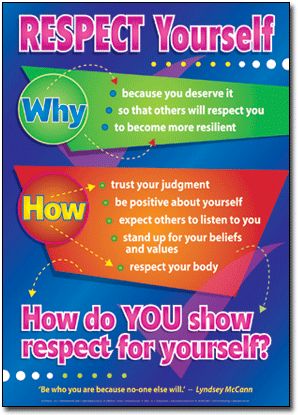
Although this isn’t always possible, try to include a few activities in your routine that make your heart happy.
These activities can be related to your social life, school, or work.
Some of them could include:
- starting a new hobby or reconnecting with one that used to make you happy
- setting your professional goals and making 90-day plans that include specific tasks that will help you achieve them
- reading a new book about personal growth, fiction, or career development
- starting a blog, vlog, or personal journal
- dancing, singing, or listening to your favorite beats
- starting a new exercise routine
- learning to cook
- planning an event for the family
- volunteering your time for a cause you’re passionate about
Doing things you’re good at, says Zuckerman, could also help you increase your sense of well-being.
4. Practicing self-care will helpRespecting yourself means taking care of yourself mentally, emotionally, socially, and physically.
Self-care activities can include:
- relaxation techniques to manage anxiety and stress
- spending time in nature
- connecting with your favorite people, even if virtually
- revising your diet to make it fit your health needs
- taking pauses to reset, rest, and recharge
5. Identify and nurture your needs
If self-respect is about taking care of yourself, it’s important that you identify what “care” means for you. What are your needs? What would make you feel fulfilled and satisfied?
“Check in with your needs on a daily basis, and instead of shaming yourself for having needs, nurture your needs,” Robin suggests.
It’s natural to feel apprehensive about spending too much time on yourself, especially if your responsibilities include taking care of others. But attending to your needs is essential to your well-being and can even prepare you to take better care of others if that’s a priority for you.
Self-esteem is about how much you love yourself.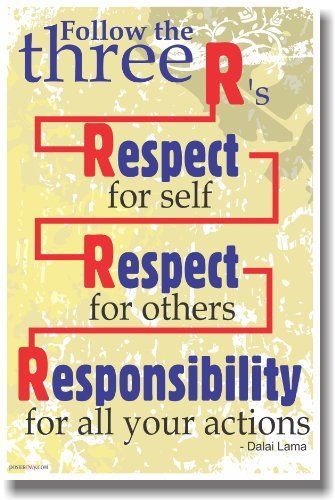 Self-respect is how you show that love to yourself. Usually, having strong self-esteem will motivate you to respect yourself more.
Self-respect is how you show that love to yourself. Usually, having strong self-esteem will motivate you to respect yourself more.
But self-esteem also tends to depend on your interactions with the world.
“Self-respect is not contingent on success or performance,” says Zuckerman. “It is more of an accepted, unchanging view of ourselves and our worth. Self-esteem, however, is based on our abilities and how well we think we can handle ourselves in a given situation.”
Respect is about value and acceptance, and esteem is about evaluation (of skills and abilities).
Self-respect is understanding and honoring your own needs. It’s knowing your worth and acting accordingly.
If you feel you can work more on your self-respect, consider identifying your values, setting boundaries, and nurturing your needs through self-care.
17 Ways to Respect Yourself (And Why It's Important)
Respect is one of the greatest gifts we could give ourselves.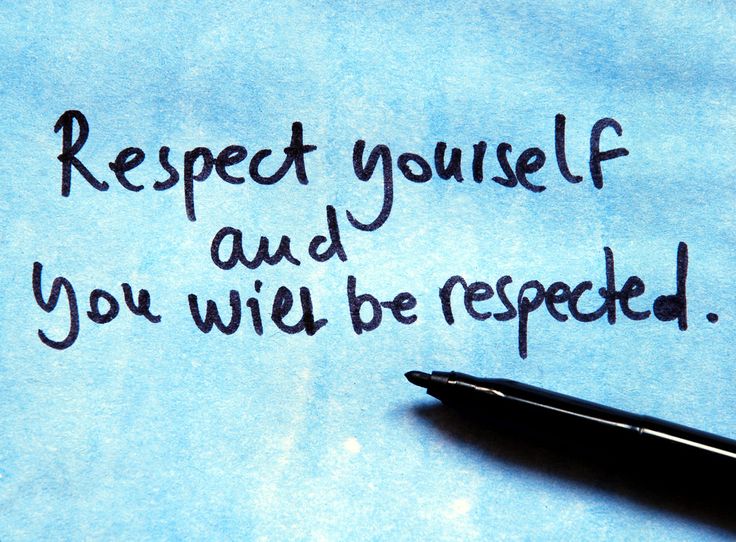 People spend lifetimes learning how to appreciate and value their own skills, opinions, and sense of self.
People spend lifetimes learning how to appreciate and value their own skills, opinions, and sense of self.
Many times we find ourselves questioning our own abilities and strengths.
How can we demand respect from others, if we often lack respect for ourselves? Let’s explore how we can change that for good, and go down the path of self-respect.
What It Means to Respect Yourself
Having self-respect impacts every aspect of your life. It means you are proud of who you are and accept your flaws or imperfections.
You don’t feel as if you have to be perfect, and you can forgive yourself for mistakes made in the past.
You know how to set healthy boundaries for yourself and others, and you stay true to those boundaries.
You don’t accept bad behavior from others and have a high expectation of how you want to be treated.
The truth is, there are many different types of people in this world, some of whom may try to take advantage of others, manipulate others, and treat others badly.
We simply cannot tolerate such behavior when we have a healthy level of self-respect for ourselves.
Let’s explore how you can respect yourself more and improve your life :
17 Ways to Respect Yourself
1. Take time for self-care
Society puts busy people on a pedestal. It’s good to be busy, but what’s better is allowing yourself the opportunity to not be busy at all. You are not a robot and can’t be productive 150% of the time.
The brain needs time to decompress so it can function at full capacity. Take that bubble bath or read for leisure. You owe it to yourself to relax!
2. Surround yourself with positive influences
You are who you surround yourself with. According to Psychology Today, the people you choose to surround yourself with largely impacts your self-image and decisions. It’s important to respect yourself in this way because your time is limited.
Every day has 24 hours, so choose your daily influences wisely. The more you surround yourself with positive people, the more inspired and motivated you’ll be.
3. Love yourself endlessly
Being in love with someone comes with no strings attached. Love comes unconditionally. It’s necessary to apply the same mentality to your self-image.
Every part of your past and part of your body is a part of you.
All of your flaws and imperfections make up the wonderful person you are today. Everyone deserves love and respect, so dole out what’s due.
4. Express how you feel when you’re hurt
People can’t give you the respect you deserve if you don’t demand it of yourself.
It’s not pleasant to tell someone you care about that they hurt you, but in doing so you respect yourself.
The people that actually matter will care about your feelings. Drop the people who don’t. Speaking up about disrespect stops people from doing it in the future.
5. Know your worth
Your time is important. You are important! Never downplay your worth to yourself or anyone else. For example, you’re a skilled professional at what you do.
By knowing your worth, you can command negotiations with employers and shut down anyone who says otherwise.
This is an important notion that can carry over to any relationship in life.
6. Stay active
You only have one body. It will carry you through the best and worst times. That being said, you can respect yourself by respecting your body.
Staying active has benefits like releasing happy chemicals called endorphins. It also just makes you feel good in general because you’ll feel fit.
7. Stay true to who you are
Never water down who you are. Working on yourself is great because everyone can always improve, but not if it means changing your identity completely.
Since everyone deserves respect, that means your true self deserves respect.
Not everyone will love you, but you will love yourself. People will love you for who you really are.
8. Follow your heart and dreams
The only thing that separates people from what they really want in this life is drive. Hard work beats out talent any day of the week.
As long as you know what you want and what will make you happy, you can work towards it.
The universe may present challenges to you, but you can overcome anything with the right mentality.
Respect what your heart wants and the dreams that come with it.
9. Don’t accept toxicity from anyonePeople only get away with as much as you let them. Whether someone is a family member or childhood friend, you deserve respect at all times.
If someone doesn’t recognize your worth, then they are not worth your time. Cut out negative people from your life and quick. You owe that to yourself.
10. Define your values
You owe yourself respect more than anything else. A way to respect yourself is by knowing who you are as a person and what you stand for.
A way to respect yourself is by knowing who you are as a person and what you stand for.
By taking the time to really reflect on what is important to you, it becomes easier to know what violates your schema.
Take the time to figure out your values in order to honor them.
11. Learn how to set boundaries
It’s not always easy to say no. When a friend is being pushy about making you go out when you’d rather read or force you into a favor, it can be uncomfortable to set boundaries.
The fact is that a part of self-respect is the ability to set guidelines about how you feel and want to be treated.
Respect yourself by being completely comfortable with the idea of only doing what makes you feel comfortable. People will respect you more for it.
12. Don’t downplay emotions
A part of respecting yourself is acknowledging that your feelings are valid. If you are sad about something, let yourself feel that way. The same goes for being angry.
The same goes for being angry.
Bottling up your emotions is unhealthy in the long-term. It only hurts you as time goes on.
13. Learn from mistakes without beating yourself up
The only mistake you can really make in life is not learning from them. Every mistake is a lesson. If you really respect yourself, you will take notes on these lessons.
It doesn’t help your self-worth by demonizing your actions. Just pick yourself up and move on with your life.
14. Get comfortable with alone time
Respecting yourself is the most important thing you can do because at the end of the day, you are all you have.
Of course, that’s not to say that you don’t have friends and family that adore you. Yet, when you’re alone in a room by yourself it is just you.
Being comfortable spending time alone and being happy with it is essential to honor yourself. You need to love yourself first before loving anyone else.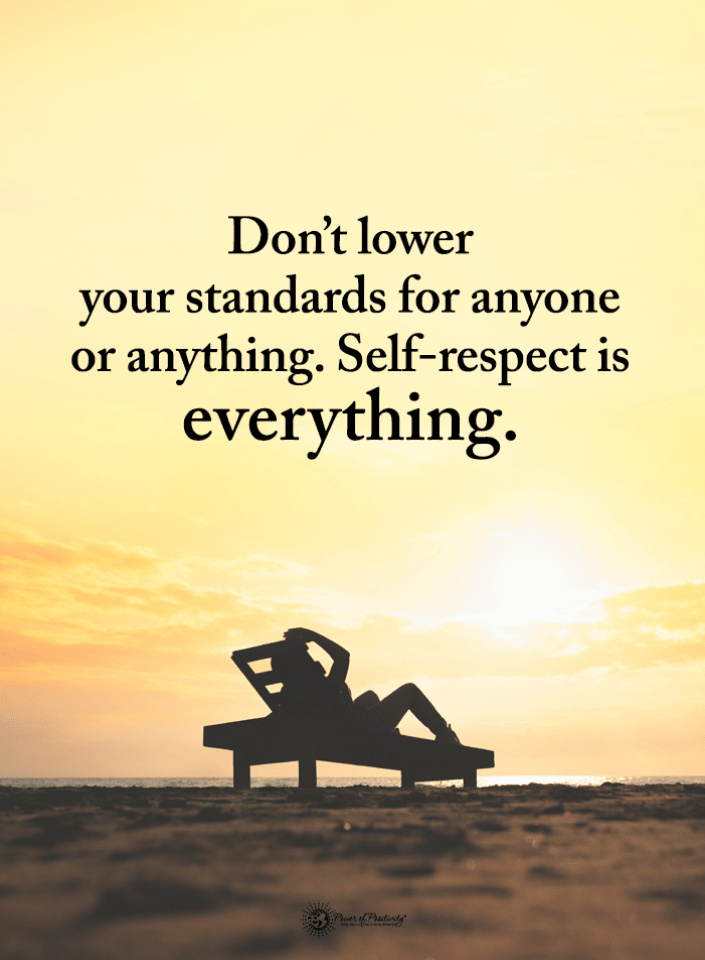
15. Spend money on happiness
McDonald’s burgers may make you happy temporarily, but memories will make you the happiest. Save money, but also spend it on experiences.
Travel to a foreign land or just a neighboring city. Go to concerts and dance with your friends. Spending money on frivolous things is just a disservice to yourself.
16. Make sure you go outside regularly
Humans are animals, although we’re a lot smarter than most. Naturally, most animals can’t be cooped up in cage all day. The same applies to you!
Science says that exploring nature has a multitude of benefits from preventing disorders to beating out pain medication in some scenarios.
Honor yourself by giving into mother nature more often. Vitamin D is essential!
17. Approach life with curiosity
Instead of dreading a decision, trust yourself to make it. Don’t be afraid of turning the next page in the chapter of your life.
Think about how interesting it would be to make a certain decision, or follow a different path.
Your mentality of how you approach life changes how you lead your life. Respect yourself enough to trust your path fully.
Always remember that respect is given, and it’s a gift that we must give ourselves each and every day. Share your thoughts in the comments below:
Respect yourself: what does it mean?
115,483
Career and self-realizationKnow yourselfA man among people
I listen to my feelings, sort through the words and phrases that come to mind. The phrase “Be above it, behave with dignity, don’t sink to his/her level!” pops up! Moreover, it emerges in the context of an insult to me by another person. I think that the idea of "be above it!" - a great help just for those who like to humiliate other people. “I humiliated you, but don’t you dare defend yourself!” Or is it, from the childhood and teenage experience: “Well, what are you, offended, or what ?!”
The experiences of one woman, once heard, are built into the chain of associations due to the fact that she became like a “market boor” in some dispute and she is terribly ashamed because of this. The notorious “insulting the feelings of believers” and “insulting honor and dignity” also arise in my mind ... Humiliation is a word and the experience behind it resonate with me as closely related to the concept of dignity. And another feeling is respect. It looks like the puzzle is starting to take shape.
The notorious “insulting the feelings of believers” and “insulting honor and dignity” also arise in my mind ... Humiliation is a word and the experience behind it resonate with me as closely related to the concept of dignity. And another feeling is respect. It looks like the puzzle is starting to take shape.
I am sure that the core of self-esteem as a complex experience is self-esteem
What is respect as such? This is a feeling that arises when we notice in another person what we ourselves consider important and significant, what we ourselves strive for. This means that self-respect is all the same, only directed at one’s “I”. I respect myself for the fact that some of my actions and deeds correspond to my ideas about what is valuable.
I single out for myself two types of respect: basic, “advanced”, and acquired, “deserved”. Basic respect is the value of a person as such, confidence in his right to be, no matter what.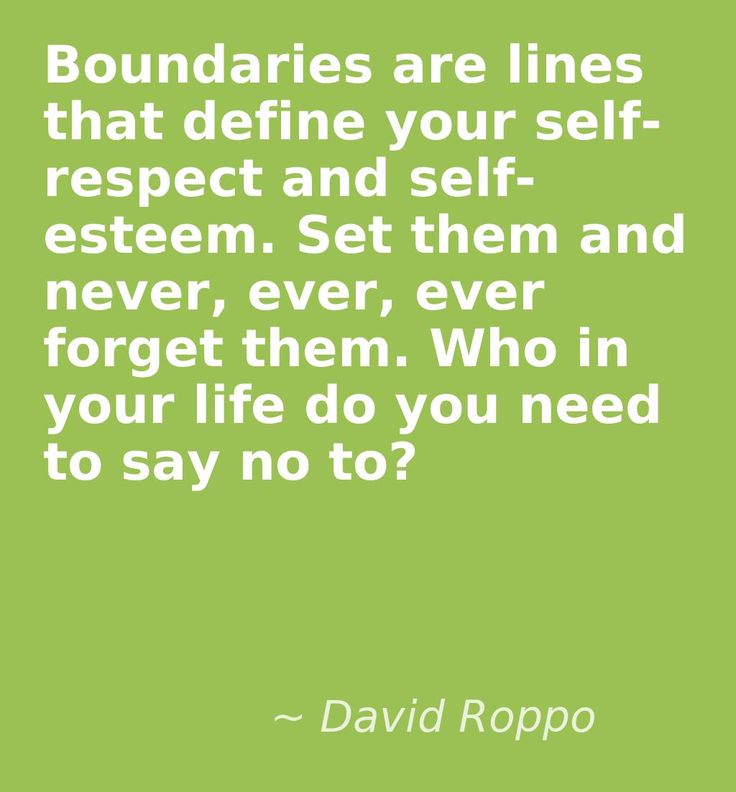 A kind of "advance": I recognize you as valuable and equal to myself, even before I met you.
A kind of "advance": I recognize you as valuable and equal to myself, even before I met you.
Respecting another person, I do not offend him, I treat him as a value
This also applies to myself. Self-esteem is based on this basic self-respect. Despite everything, I have the right to be, I have my place in this world, and no one has the right to deprive him of it. To try to humiliate means to try to throw a person from this place into the dirt. Make him doubt that he is even entitled to anything. "Your place is with..."
To respect oneself means to notice in oneself what one perceives as valuable and important. First of all, your needs, emotions and life values. And for this it is necessary to feel them and imagine your own system of values, that is, to have personal ethics experienced in real experience. And it is woven from hopes and disappointments, shame and disgrace from failures, triumph from triumph; struggle for recognition and much more.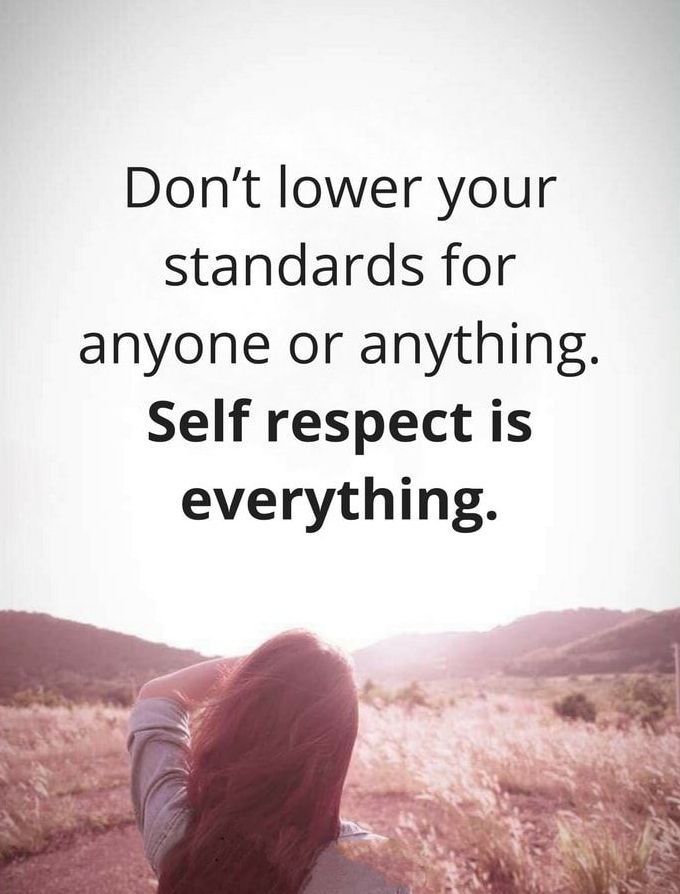
That is, this ethics inevitably changes over time, enriched with new experience. What seemed gold at one age turns to brass at another. Also good, but not gold.
Personal ethics is not thought up — it is found in what we do and sometimes — we say
rude." If in the ethical hierarchy “being liked by others” is higher than “protecting your children,” yes, then shame and loss of self-respect can arise. If your son is more significant, self-respect will only be strengthened.
I think that in the awareness of this hierarchy lies the ability to resist manipulators who are trying to insult or humiliate us, and then, in order to protect themselves, devalue our indignation with such attempts: “They carry water on the offended”, “Be higher than this, forget it”, “You are a reasonable person”, “I was just joking, don’t you understand jokes?”.
I want to say, “You see, I don't like being treated like this.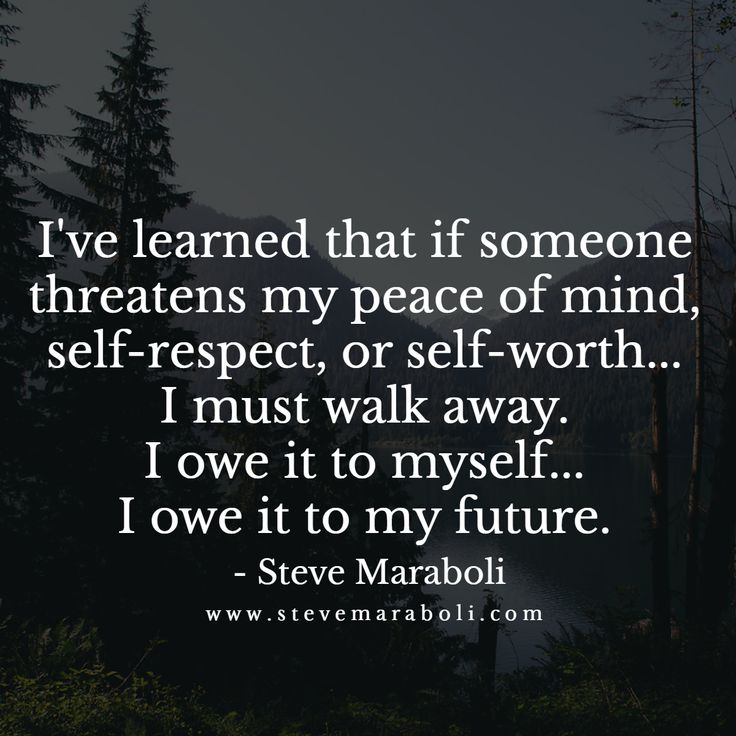 And I don't care what you think you need to be above it. Trying to humiliate me - either stop it, or that's it. It's not possible with me. Even pretend. Even once." "Be above it!" - good manipulation for those who like to insult themselves, but are afraid to face the consequences.
And I don't care what you think you need to be above it. Trying to humiliate me - either stop it, or that's it. It's not possible with me. Even pretend. Even once." "Be above it!" - good manipulation for those who like to insult themselves, but are afraid to face the consequences.
You can, of course, confuse self-respect and pride - so many do. But pride is defined in the body as a feeling that straightens and bursts from within, and self-respect is defined as a feeling of stability, core, firmness. I also think that self-respect is not only a consequence of certain actions, but also a reason, a guideline that forms an upward spiral: I do this because I will respect myself for it, and I respect myself for having acted this way.
There is such a fear inherent in people with a well-formed worldview and personal ethics: to betray oneself, that is, to do something that will make one stop respecting oneself. And this is a very powerful guideline that allows you to put a lot in its place in life.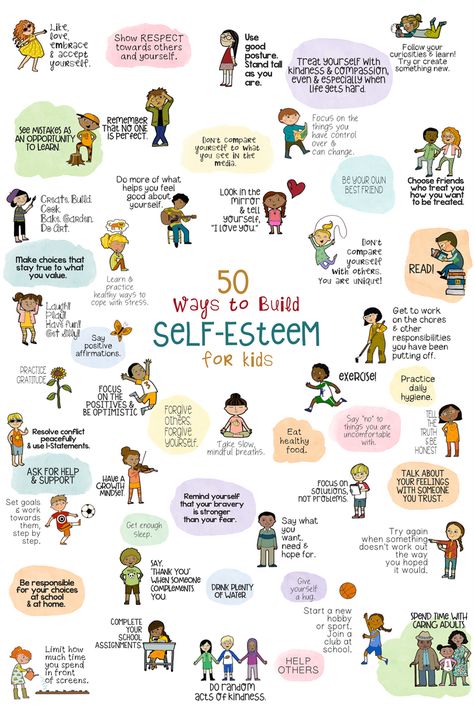
In the end, betrayal of oneself does not pay off with anything from the outside, deals with one's own conscience, as a rule, are unprofitable for conscience
However, I do not know people who would never step on the throat of their own song and not pretend to be. It is convenient to be with principles, but sometimes life throws up tasks in which there are no good solutions, and in any case, you will betray something in yourself. It happens.
And sometimes, even without such alternatives, we make a choice for which our conscience then pays. He renounced a friend, because others condemn him, could not defend himself in some kind of conflict. We can recall many examples when we fail, in which it is self-respect that suffers. How then to restore it? The answer is simple: do what you respect. That's all.
No need to try to fix the past. Moreover: one of the traits I most respect is the ability to admit one’s imperfection and, at the moment of failure or shame, stand up and, experiencing shame or fear, still go in the direction that is important to you.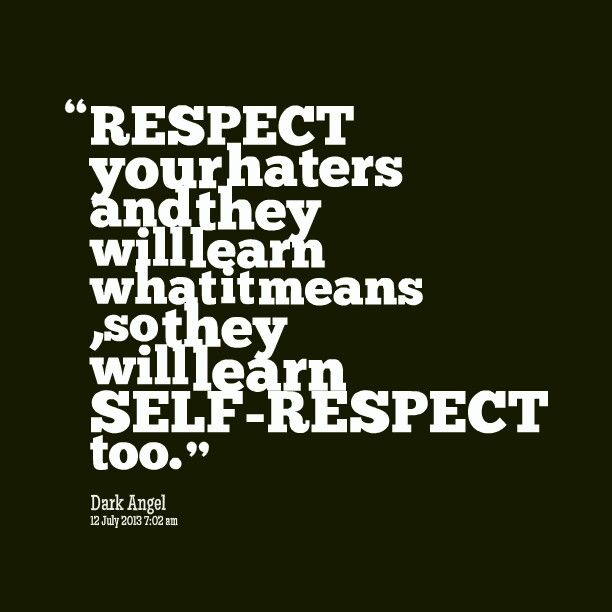 That is why someone else's failure or failure is not a reason for me to lose respect for a person.
That is why someone else's failure or failure is not a reason for me to lose respect for a person.
And if I don't deny respect to another person in such a situation, why should I deny myself this?
What matters is not what you have, but what you have done. And if we continue further, it is important not so much what you did, but what qualities you showed to do it. Accordingly, success or failure become relative categories. More significant is how I went to success or failure, and how I perceived them: bloated with importance, fell into self-deprecation, simply rejoiced in victory, mourned, clenched my teeth and stood up after defeat.
Children, by the way, feel this difference very well. If you want to praise - pay attention to the qualities that the child showed in order to achieve something, and not for achievements as such. Then he will learn to respect his effort, whether he succeeds or fails.
Self-respect makes it possible to perceive criticism, because it ceases to be a humiliation, since failure is no longer a sentence, but simply an eventful fact or - the achievement of something - the qualities that a person shows in his activities.

So, self-esteem is the ability to appreciate one's own existence as such, to see in oneself what one considers significant, and the ability to focus on these values. However, it is not necessary to see something valuable in yourself. You can create it - just by doing what you consider worthy of respect. I don't know of any other way to gain self-respect.
Text: PSYCHOLOGIES.RU editors Photo source: Unsplash
New on the site
“I am a jester in society. Why don't they take me seriously?"
“I tried to leave my alcoholic husband twice, but returned each time”
“Screaming is the last argument”: 3 life examples - how to respond to manipulation
How to record an audio message or tiktok
International Men's Day: what is important to know men in order to maintain strength and health
Why everyone in the Teplyakov family is happy: the psychologist named 3 reasons
“I found out that my husband was texting a young girl.
I don't know what to do in this situation."0003
3 food allergy signs you didn't know about before
How to learn to respect yourself | PSYCHOLOGIES
184,909
Know Yourself
Agree: if we do not love and appreciate ourselves, then, willy-nilly, we begin to blame others for the pain we experience, and as a result we are overcome by anger, frustration and depression.
But what does it mean to respect yourself? I love the definition that young Kathy gave: “It means accepting yourself for who you are and forgiving yourself for the mistakes you have made. It's not easy to come to this. But if you can eventually walk up to the mirror, look at yourself, smile and say, "I'm a good person!" “It’s such a wonderful feeling!”
She's right: healthy self-esteem is based on the ability to see yourself in a positive way. Here are seven principles to help you feel better about yourself.
1. Your self-image should not depend on other people's assessments
Many of us form our self-image based on what others say.
This leads to the development of real dependence - a person cannot feel normal without approving assessments.
Such people seem to be saying, “Please love me, and then I can love myself. Accept me, and then I can accept myself." They will always lack self-respect, as they cannot free themselves from the influence of other people.
2. Don't talk bad about yourself
Your mistakes and weaknesses do not define you as a person. The more you say to yourself: "I'm a loser, no one loves me, I hate myself!" - the more you believe these words. Conversely, the more often you say: “I deserve love and respect,” the more you begin to feel worthy of this person.
Try to think more often about your strengths, about what you can give to others.
3. Don't let others tell you what to do and be
It's not about the arrogant "my interests above all", but about not letting others tell you how to think and what to do. To do this, you need to know yourself well: your strengths and weaknesses, emotions and aspirations.
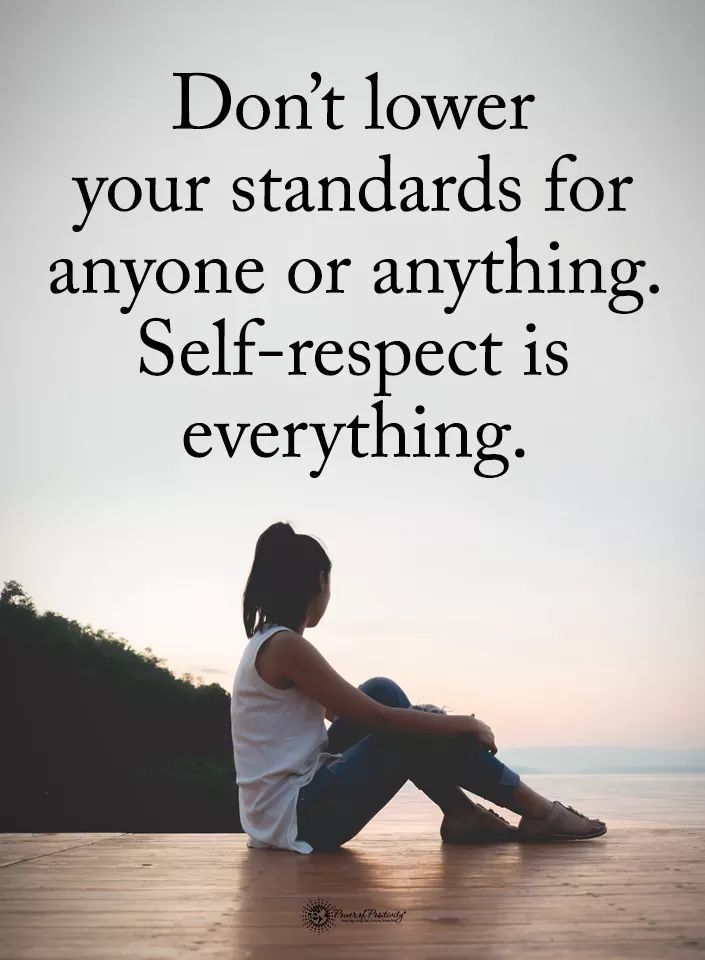
Do not adapt to the desires and requirements of others, do not try to change just to please someone. This behavior has nothing to do with self-respect.
4. Be true to your moral principles
Many do not respect themselves because they once committed unseemly acts and compromised moral principles. There is a good saying about this: “If you start thinking better about yourself, then you will act better. And the better you act, the better you will think of yourself.” And this is true.
The converse is also true. Think badly about yourself - and behave accordingly.
5. Learn to control emotions
Self-respect implies that we can control our emotions so as not to harm ourselves and others. If you uncontrollably show anger or resentment, then you put yourself in an awkward position, and possibly destroy relationships with others, and this inevitably reduces your self-esteem.
6. Expand your horizons
Look around: many people live in their little world, believing that no one needs their thoughts and knowledge.
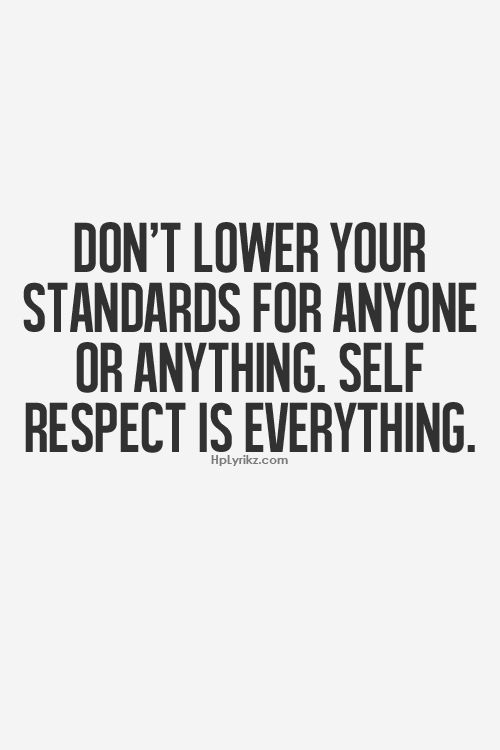
Learn more
